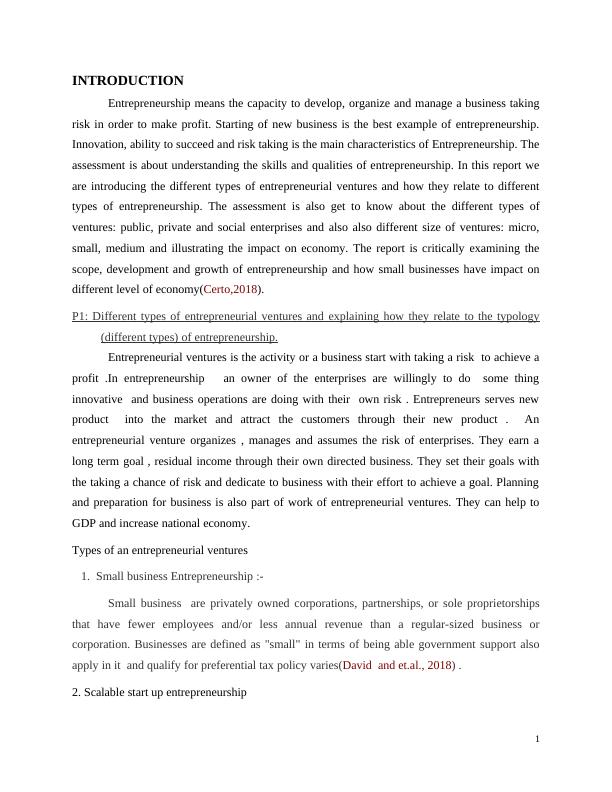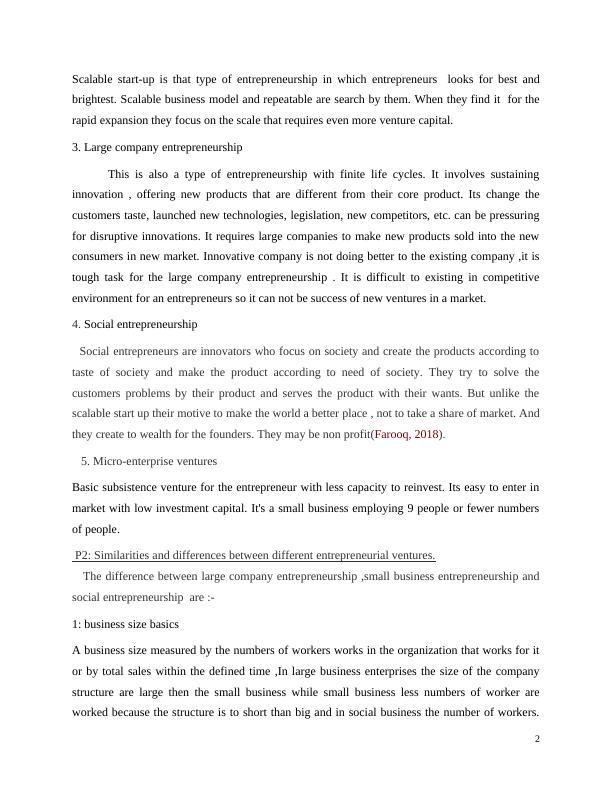Report on Development and Gowth of Entrepreneurship
Added on 2020-06-04
13 Pages3725 Words24 Views
ESBM

Table of Contents
INTRODUCTION..........................................................................................................................................................1
P1: Different types of entrepreneurial ventures and explaining how they relate to the typology (different types) of
entrepreneurship........................................................................................................................................................1
P2: Similarities and differences between different entrepreneurial ventures...........................................................2
P3: Impacts of micro business and small business on economy..............................................................................4
P4: Explain the importance that small businesses and business start-ups on the growth of the social economy.. .5
P5. the characteristic traits and skills of an Entrepreneur.........................................................................................7
P6.Aspects of the entrepreneurial personality reflect entrepreneurial motivation and
mindset.....................................................................................................................................................................8
P7.person’s background and past experiences can hinder or
foster entrepreneurship.............................................................................................................................................9
CONCLUSION...............................................................................................................................................................9
REFERENCES..............................................................................................................................................................10
INTRODUCTION..........................................................................................................................................................1
P1: Different types of entrepreneurial ventures and explaining how they relate to the typology (different types) of
entrepreneurship........................................................................................................................................................1
P2: Similarities and differences between different entrepreneurial ventures...........................................................2
P3: Impacts of micro business and small business on economy..............................................................................4
P4: Explain the importance that small businesses and business start-ups on the growth of the social economy.. .5
P5. the characteristic traits and skills of an Entrepreneur.........................................................................................7
P6.Aspects of the entrepreneurial personality reflect entrepreneurial motivation and
mindset.....................................................................................................................................................................8
P7.person’s background and past experiences can hinder or
foster entrepreneurship.............................................................................................................................................9
CONCLUSION...............................................................................................................................................................9
REFERENCES..............................................................................................................................................................10

INTRODUCTION
Entrepreneurship means the capacity to develop, organize and manage a business taking
risk in order to make profit. Starting of new business is the best example of entrepreneurship.
Innovation, ability to succeed and risk taking is the main characteristics of Entrepreneurship. The
assessment is about understanding the skills and qualities of entrepreneurship. In this report we
are introducing the different types of entrepreneurial ventures and how they relate to different
types of entrepreneurship. The assessment is also get to know about the different types of
ventures: public, private and social enterprises and also also different size of ventures: micro,
small, medium and illustrating the impact on economy. The report is critically examining the
scope, development and growth of entrepreneurship and how small businesses have impact on
different level of economy(Certo,2018).
P1: Different types of entrepreneurial ventures and explaining how they relate to the typology
(different types) of entrepreneurship.
Entrepreneurial ventures is the activity or a business start with taking a risk to achieve a
profit .In entrepreneurship an owner of the enterprises are willingly to do some thing
innovative and business operations are doing with their own risk . Entrepreneurs serves new
product into the market and attract the customers through their new product . An
entrepreneurial venture organizes , manages and assumes the risk of enterprises. They earn a
long term goal , residual income through their own directed business. They set their goals with
the taking a chance of risk and dedicate to business with their effort to achieve a goal. Planning
and preparation for business is also part of work of entrepreneurial ventures. They can help to
GDP and increase national economy.
Types of an entrepreneurial ventures
1. Small business Entrepreneurship :-
Small business are privately owned corporations, partnerships, or sole proprietorships
that have fewer employees and/or less annual revenue than a regular-sized business or
corporation. Businesses are defined as "small" in terms of being able government support also
apply in it and qualify for preferential tax policy varies(David and et.al., 2018) .
2. Scalable start up entrepreneurship
1
Entrepreneurship means the capacity to develop, organize and manage a business taking
risk in order to make profit. Starting of new business is the best example of entrepreneurship.
Innovation, ability to succeed and risk taking is the main characteristics of Entrepreneurship. The
assessment is about understanding the skills and qualities of entrepreneurship. In this report we
are introducing the different types of entrepreneurial ventures and how they relate to different
types of entrepreneurship. The assessment is also get to know about the different types of
ventures: public, private and social enterprises and also also different size of ventures: micro,
small, medium and illustrating the impact on economy. The report is critically examining the
scope, development and growth of entrepreneurship and how small businesses have impact on
different level of economy(Certo,2018).
P1: Different types of entrepreneurial ventures and explaining how they relate to the typology
(different types) of entrepreneurship.
Entrepreneurial ventures is the activity or a business start with taking a risk to achieve a
profit .In entrepreneurship an owner of the enterprises are willingly to do some thing
innovative and business operations are doing with their own risk . Entrepreneurs serves new
product into the market and attract the customers through their new product . An
entrepreneurial venture organizes , manages and assumes the risk of enterprises. They earn a
long term goal , residual income through their own directed business. They set their goals with
the taking a chance of risk and dedicate to business with their effort to achieve a goal. Planning
and preparation for business is also part of work of entrepreneurial ventures. They can help to
GDP and increase national economy.
Types of an entrepreneurial ventures
1. Small business Entrepreneurship :-
Small business are privately owned corporations, partnerships, or sole proprietorships
that have fewer employees and/or less annual revenue than a regular-sized business or
corporation. Businesses are defined as "small" in terms of being able government support also
apply in it and qualify for preferential tax policy varies(David and et.al., 2018) .
2. Scalable start up entrepreneurship
1

Scalable start-up is that type of entrepreneurship in which entrepreneurs looks for best and
brightest. Scalable business model and repeatable are search by them. When they find it for the
rapid expansion they focus on the scale that requires even more venture capital.
3. Large company entrepreneurship
This is also a type of entrepreneurship with finite life cycles. It involves sustaining
innovation , offering new products that are different from their core product. Its change the
customers taste, launched new technologies, legislation, new competitors, etc. can be pressuring
for disruptive innovations. It requires large companies to make new products sold into the new
consumers in new market. Innovative company is not doing better to the existing company ,it is
tough task for the large company entrepreneurship . It is difficult to existing in competitive
environment for an entrepreneurs so it can not be success of new ventures in a market.
4. Social entrepreneurship
Social entrepreneurs are innovators who focus on society and create the products according to
taste of society and make the product according to need of society. They try to solve the
customers problems by their product and serves the product with their wants. But unlike the
scalable start up their motive to make the world a better place , not to take a share of market. And
they create to wealth for the founders. They may be non profit(Farooq, 2018).
5. Micro-enterprise ventures
Basic subsistence venture for the entrepreneur with less capacity to reinvest. Its easy to enter in
market with low investment capital. It's a small business employing 9 people or fewer numbers
of people.
P2: Similarities and differences between different entrepreneurial ventures.
The difference between large company entrepreneurship ,small business entrepreneurship and
social entrepreneurship are :-
1: business size basics
A business size measured by the numbers of workers works in the organization that works for it
or by total sales within the defined time ,In large business enterprises the size of the company
structure are large then the small business while small business less numbers of worker are
worked because the structure is to short than big and in social business the number of workers.
2
brightest. Scalable business model and repeatable are search by them. When they find it for the
rapid expansion they focus on the scale that requires even more venture capital.
3. Large company entrepreneurship
This is also a type of entrepreneurship with finite life cycles. It involves sustaining
innovation , offering new products that are different from their core product. Its change the
customers taste, launched new technologies, legislation, new competitors, etc. can be pressuring
for disruptive innovations. It requires large companies to make new products sold into the new
consumers in new market. Innovative company is not doing better to the existing company ,it is
tough task for the large company entrepreneurship . It is difficult to existing in competitive
environment for an entrepreneurs so it can not be success of new ventures in a market.
4. Social entrepreneurship
Social entrepreneurs are innovators who focus on society and create the products according to
taste of society and make the product according to need of society. They try to solve the
customers problems by their product and serves the product with their wants. But unlike the
scalable start up their motive to make the world a better place , not to take a share of market. And
they create to wealth for the founders. They may be non profit(Farooq, 2018).
5. Micro-enterprise ventures
Basic subsistence venture for the entrepreneur with less capacity to reinvest. Its easy to enter in
market with low investment capital. It's a small business employing 9 people or fewer numbers
of people.
P2: Similarities and differences between different entrepreneurial ventures.
The difference between large company entrepreneurship ,small business entrepreneurship and
social entrepreneurship are :-
1: business size basics
A business size measured by the numbers of workers works in the organization that works for it
or by total sales within the defined time ,In large business enterprises the size of the company
structure are large then the small business while small business less numbers of worker are
worked because the structure is to short than big and in social business the number of workers.
2

End of preview
Want to access all the pages? Upload your documents or become a member.
Related Documents
The Impact of Micro and Small Business on the Economylg...
|17
|5294
|373
Entrepreneurship And Small Business Management 2 INTRODUCTION 1 LO11 P1. Similarities and differences between entrepreneurial ventures and their interconnectedness with micro and small businesslg...
|15
|4771
|426
Entrepreneurship and Small Business Managementlg...
|11
|2485
|357
Micro and Small Business Enterprises Impact on the Economylg...
|16
|5176
|184
(solution)Entrepreneurship and Small Business Managementlg...
|14
|4787
|29
Management For Small Business : Assignmentlg...
|16
|5217
|196
